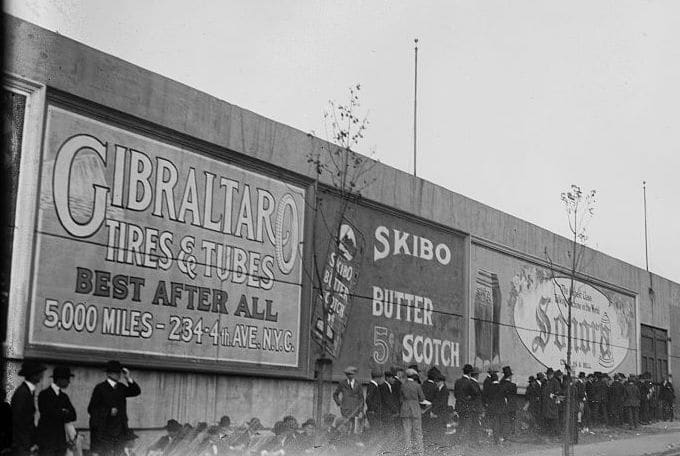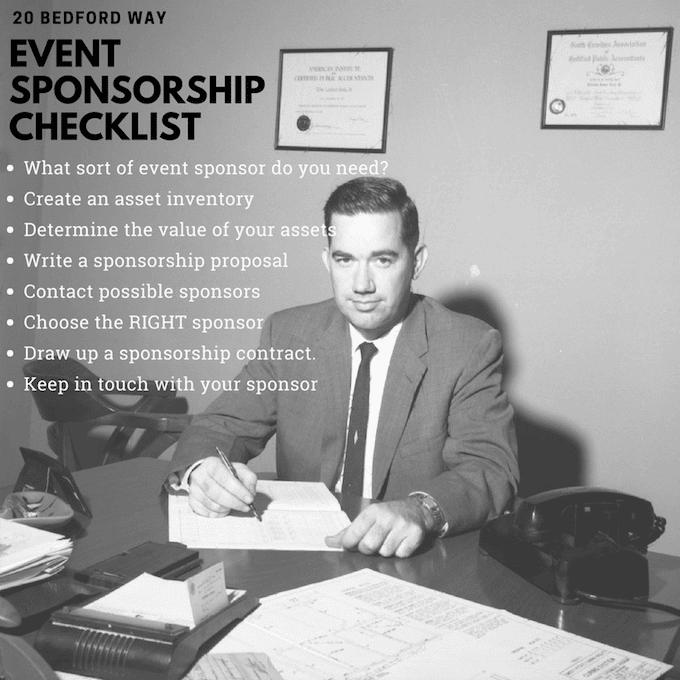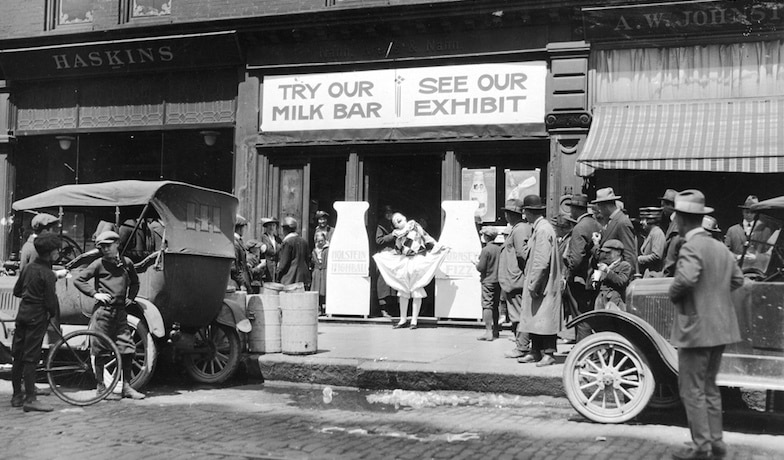How to get Sponsors for an Event
In 2019 event sponsorship is a common concept and a consideration for most event planners. If you are putting on any type of event, sponsorship represents a great opportunity for both you and your sponsor. Some events will even have multiple sponsors. Event sponsorship is now permeating smaller local festivals and events all over the UK.
So, just why is sponsorship for an event so important and popular? Let’s take a look at the what, why and how of event sponsorship.
What is Event Sponsorship?
Event sponsorship is when a business or organisation supports an event financially or by providing products or services. The business or organisation providing this support is known as a sponsor.
More widely it’s a type of promotion where two parties mutually benefit from an agreement to work together. It can be instigated from either side. An event organiser may well identify suitable sponsors and contact them to see if they would like to sponsor their event. Alternatively, a company can develop sponsorship relations with a particular event.
The Benefits of Event Sponsorship
The symbiotic relationship between event organiser and sponsor is extremely important for several reasons. Ultimately, sponsorship offers a number of benefits to both the event planner AND the sponsor.
Why would an Event have a Sponsor?
Event organisations often use sponsorship for three reasons:
– To fund the event. Sponsors will help to finance your event so that you can create the best event experience for your audience.
– To raise the profile of the event and reach new audiences. If your sponsor has a large audience, an event organiser has the opportunity to promote their event to that audience. Having a well-known sponsor may help you to sell more event tickets.
– Being connected to or associated with a reputable or ‘cool’ brand will enhance your credentials. This is why choosing a sponsor that is a good fit for your event is so important.
Why would a Company Sponsor an Event?
What’s in it for them? Event sponsorship is a part of a company’s integrated marketing plan. Businesses are always on the lookout for lucrative event sponsorship opportunities. This is because they stand to gain a lot from the relationship.
Marketers are tasked with getting their brand, product or company in front of relevant audiences. If they can do this at volume at an event, all the better. The business will have permission to display their branding at the event and some marketing materials. Marketers know that if they match their product or brand to the right event, they can get visibility among and access to hard-to-reach target audiences. As an event planner you should always be aware of the unique opportunity you can offer marketers.
The Different Types of Event Sponsorship
There are four main types of sponsors that an event organiser could consider. These are categorised in a Gevme article and summarised below. It’s important to know the difference between each type and what they can offer you.
Financial sponsorship
These sponsors give money to your event in exchange for a series of pre-determined benefits. These will be outlined in a sponsorship agreement. Examples include logo placement at the event venue and on promotional materials, pre and post-event content creation and any activity during the event itself.
Media sponsorship
The budgets required to gain media exposure are often prohibitive. Therefore, finding a media sponsor can be extremely useful. These sponsors will pay for some media coverage whether that’s a TV ad or an article in a relevant publication. They may also use their own channels to promote your event.
In-kind sponsorship
This type of sponsorship focuses on the provision of products or services rather than cash. This can be a venue space, catering, drinks, or providing additional event sessions.
Promotional partners
Partnering withpublic figures, bloggers or local celebrities who have considerable influence and / or a lot of followers can give your event the boost it needs. They can. help promote your event to their own audiences in various ways.
How to get a Sponsor for an Event

Image via The Library of Congress on Flickr
How to ask for Sponsorship
In order to get a sponsor for your event you’ll need to put together a business case proposal that you can send to your prospective sponsors. They’ll need to know lots of information about your event. This should include:
- Who you are
- What your event is
- Where your event is
- Who will be attending (demographics)
- How many people will be attending
It’s important to note that selecting the right sponsor is probably the most important aspect of this process. We’ll touch on this a little later. Always tailor the proposal so that it has the right tone of voice to communicate with that sponsor and highlights specific benefits to them. Demonstrate that you understand the business you are approaching for sponsorship by knowing their needs and speaking their language.
Writing an event sponsorship proposal can be quite tricky as you will need to include a cost of investment for your sponsor. The best way to do is to evaluate what you have to offer. There are several steps to take before you can affectively estimate how much your event is worth in terms of sponsorship:
Listing Marketing Assets
Your event represents an opportunity for the sponsor to display their brand. Walk through your event venue and identify all the potential places that a sponsor might advertise their brand name and/or logo.
Typical places for branding are:
- banners over entrances and exits
- banners on stage
- logos on presentation screens
- refreshment zones
- event programs
- information points
There will also be other ways that a sponsor will be able to market themselves at your event. If you have a backstage area this could be an opportunity for your sponsor to give away samples of products. They can also provide items for goody bags that are given out to attendees.
From this you will have a marketing assets inventory. Other assets for your event could include:
- Naming rights of programs
- Product giveaways and samples
- Exhibiting opportunities at the event
- Speaking opportunities at the event
- Mentions on your website
- Social media mentions in your marketing posts
- Newsletters and mailings
Each marketing opportunity for your sponsor is an asset you can offer. To help with your proposal, list all of these assets as you go.
Determine Reach
Now that you know what you have to offer it’s important to calculate the potential reach of each asset. Corporate sponsorship is a form of advertising so charting the possible impact of your assets will be key when trying to attract a sponsor.
In order to do this you’ll need to know a few things:
- how many people will be attending the event.
- how many people will receive programs and other material, like goody bags.
Think about how many times that asset will be seen by each person. This will depend on where it is and how prominent its position. For example, if your asset is above the entrance you can be pretty confident in forecasting that every person that attends your event will see that asset each time they pass through.
This will give you an idea of how many people will see those assets. Use your asset list to chart potential reach for each asset.
Evaluate your Assets
You should now have an inventory of all assets available to your sponsor with some idea of how many impressions each asset could get.
It is hard to put a cost against each asset. This will really depend on the size and types of businesses you approach for sponsorship. You might feel that your sponsor can afford slightly higher prices because they are a big business. On the other hand, if you are trying to attract fledgling businesses you might decide to drop the cost of each asset.
Setting costs for each asset is difficult but factor in how many people will be coming to that event, the type of person and how easy they are to reach via other channels, and the size of the businesses you are approaching for sponsorship. Estimate the value each impression would be for each asset to that business. While this won’t give you a concrete figure, you’ll be able to judge individual assets and decide which ones should be sold for a higher value.
Package Your Assets
Instead of selling each asset individually, packaging up your assets to be sold as bundles will ultimately help you with a written proposal and your bottom line. If you can categorise the value of each bundle, it will help your sponsor with an ROI.
This also means that your sponsor will be bound to buying a substantial number of assets rather than just a few. Essentially, you’ll make more money if you can group your assets together.
Break down your assets into value categories. For example, Tier 1 would contain the highest value assets, Tier 2 for medium range assets and Tier 3 would contain your smallest and less prominent assets – the cheapest option for your sponsor. This will then allow you to list event sponsorship costs for sponsors.
In addition to the important numbers, make a list of the benefits companies will receive from sponsoring your event. This could be exposure to potential customers and media through:
- expected event attendance
- website-based & social media promotional efforts
- lead generation
- event signage
- advertising inclusion
- viral marketing efforts
You should now have everything you need for a compelling, comprehensive and business-like sponsorship proposal document.
Choosing the Right Sponsor for your Event
When considering sponsorship for your event, it’s important to recognise that you will need to find a partner that suits your event. This should be your primary focus. Are they a good fit for your event? Are your target audiences the same or can they promote you to new audiences? Do they represent the same values as your event organisation – do you want to be associated with that brand? Are there any risks associated with the sponsor? You need to analyse the demographic of your attendees and consider your brand values before identifying sponsors that are a good fit.
Finding the right sponsor for your event should be a priority. Get it right and the relationship between the event organisation and sponsor will reap big rewards for both parties in the short and long term.
Finding Sponsors for an Event: Our Top Tips
There are several ways to find sponsors for your event. Here are three ways to identify the perfect sponsor.
One – Talk to employees, partners, members on your board etc. to find out what connections they have. Look through your contacts on Facebook and LinkedIn to see if there is anyone that can help make a connection for you. Perhaps they can introduce you to people who handle corporate sponsorships for businesses.
Two – List out all of the businesses you think your event would appeal to. Visit their websites to get contact details. Similarly, research which companies have sponsored events similar to yours. Avoid online forms or chatbots as your correspondence might be missed or ignored. Source phone numbers or relevant email addresses of the decision makers within that business.
Three – Contact an events sponsorship agency. They will help to connect you to relevant potential sponsors.
Managing your Relationship with an Event Sponsor
As a sponsorship is essentially a business deal between you and your sponsor it is a good idea to have an event sponsorship agreement or contract. This will contain the specific details, along with terms and conditions of your agreement. Having written confirmation in the form of a contract means any transactions between parties are recorded and agreed to.
Once you secure your event sponsor and an agreement is in place, be sure to treat them well if you want them to come back for future events. A great way to ensure this happens is dedicating someone on your team to manage sponsor relations. They can liaise between parties to make sure all details are covered off.
Event Sponsorship Checklist

There you have it. Hopefully you’ve learnt a lot about securing a sponsor for your event. Please Like or Share this article and spread the knowledge.
20 BEDFORD WAY – CENTRAL LONDON EVENT VENUE WITH A DIFFERENCE
If you are looking for a central London venue with amazing transport links then 20 Bedford Way is for you. We have highly affordable rates, good evening and weekend availability including our 910 seater theatre Logan Hall. Contact us today on 020 7612 6143.
Header image via Cornell University Library on Flickr




